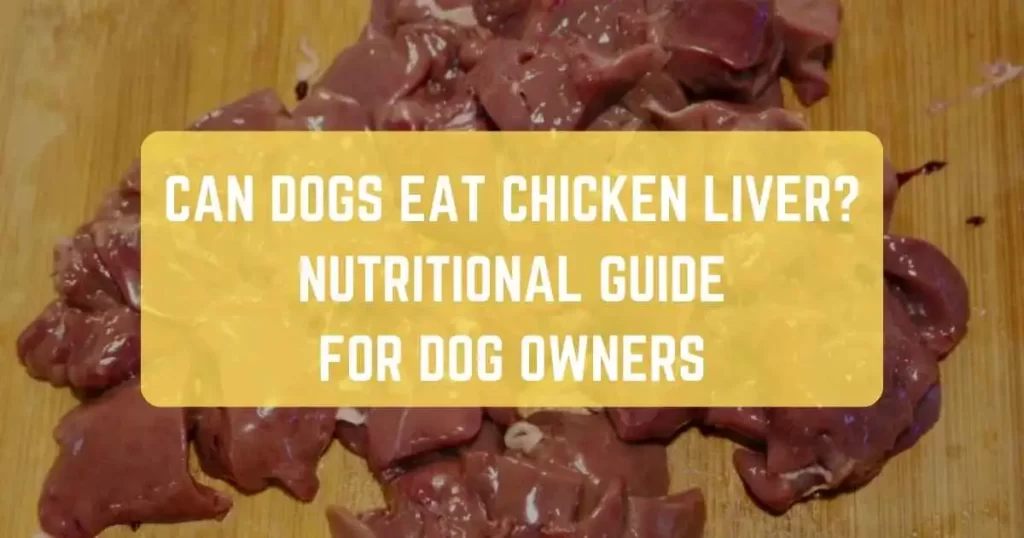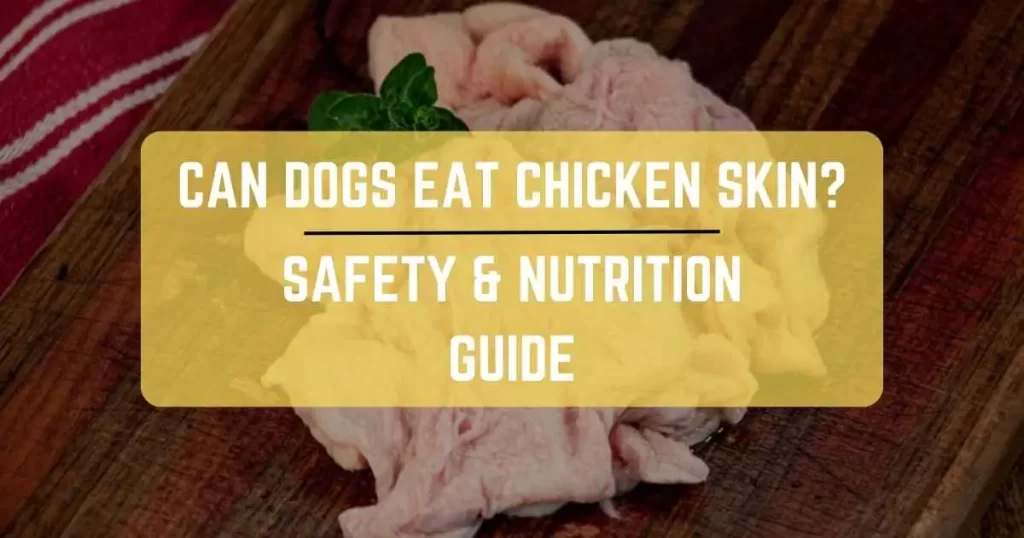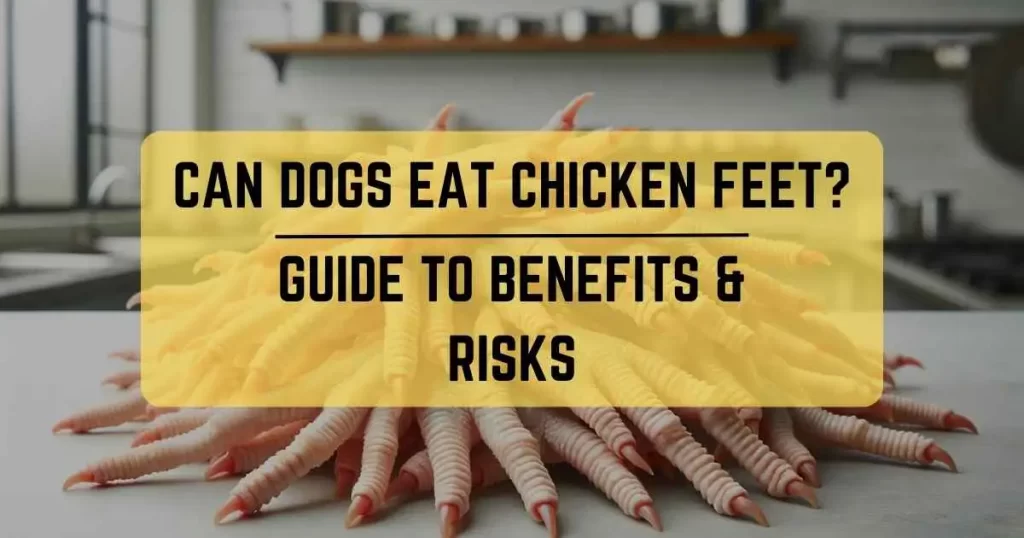
As a dog owner, you’re likely familiar with the soulful eyes and persistent tail wags that accompany your canine companion whenever food is involved. Amidst the myriad choices in the realm of dog food, you may have wondered about the delectable delight of chicken.
But before you rush to satisfy those eager taste buds, it’s crucial to understand the physiological intricacies and potential pitfalls of this seemingly innocent culinary venture.
In this concise guide, we’ll unravel the nutritional secrets and unveil the lurking risks of feeding dogs chicken, navigating the raw vs. cooked conundrum, and revealing the safest methods to ensure your furry friend indulges in this tasty treat with optimal health and happiness.
Can Dogs Eat Chicken?
Yes, dogs can eat chicken. It’s a good source of lean protein and nutrients. However, ensure it’s cooked thoroughly, boneless, and free from seasoning. Moderation is key to preventing digestive issues and consult your vet if introducing it into your dog’s diet for the first time.
Nutritional Value of Chicken for Dogs
Here is a table showing the nutritional value of chicken for dogs per 100 grams:
| Nutrient | Amount |
| Calories | 165 |
| Protein | 31 grams |
| Fat | 5 grams |
| Carbohydrates | 0 grams |
| Fiber | 0 grams |
| Vitamin A | 10% of the Daily Value (DV) |
| Vitamin B6 | 20% of the DV |
| Niacin | 25% of the DV |
| Selenium | 20% of the DV |
| Phosphorus | 15% of the DV |
| Magnesium | 5% of the DV |
Chicken is a good source of protein for dogs, which is essential for muscle growth and repair. It is also a good source of vitamins and minerals, such as vitamin A, vitamin B6, niacin, selenium, phosphorus, and magnesium.
However, it is important to note that chicken should not be the only source of nutrition in a dog’s diet. Dogs also need other nutrients, such as carbohydrates, fats, fiber, and other vitamins and minerals. A balanced diet will help to ensure that your dog gets all of the nutrients they need to stay healthy.
Nutritional Benefits of Chicken for Dogs
Chicken can be a healthy addition to your dog’s diet, offering a range of nutritional benefits. Here are some key advantages:
- Protein Powerhouse: Chicken is rich in high-quality protein, essential for your dog’s muscle development, growth, and overall well-being.
- Vitamins and Minerals: It contains essential vitamins like B6 and B3, as well as important minerals like phosphorus and selenium, promoting healthy bones and organ function.
- Low in Fat: Skinless chicken breast is lean and low in fat, making it an excellent choice for dogs with weight concerns.
- Amino Acids: Chicken provides essential amino acids, which support your dog’s immune system, skin, and coat health.
- Tasty and Palatable: Most dogs love the taste of chicken, making it a convenient treat or supplement for their regular diet.
Risks Associated with Feeding Dogs Chicken
While chicken offers numerous benefits, there are some risks dog owners should be aware of:
- Raw Chicken: Feeding raw chicken can expose dogs to harmful bacteria like Salmonella and E. coli, potentially leading to food poisoning in dogs and humans alike.
- Chicken Bones: Cooked chicken bones can splinter and cause serious internal injuries to dogs, so avoid giving your dog cooked chicken off the bone.
- Seasonings: Avoid seasoned or heavily spiced chicken, as the spices and herbs used can be harmful to dogs.
- Allergies: Just like humans, some dogs may be allergic to chicken, so monitor your dog for signs of an allergic reaction when introducing it to their diet.
Raw vs Cooked Chicken for Dogs
One critical decision dog owners face when considering chicken for their pets is whether to serve it raw or cooked. Both options have their pros and cons.
Raw Chicken: Advocates of a raw food diet for dogs argue that raw chicken retains more of its natural nutrients, including enzymes and amino acids. However, it comes with significant risks, such as the potential for bacterial contamination. Feeding dogs raw chicken should be approached with caution, and thorough hygiene practices are essential.
Cooked Chicken: Cooking chicken thoroughly eliminates the risk of harmful bacteria like Salmonella. Boiled or baked chicken, especially skinless breast meat, is a safe choice for your dog. Cooking also makes the chicken more digestible and reduces the risk of splintered bones.
How to Choose the Right Chicken for Your Dog?
Selecting the right chicken for your dog is crucial to their health and safety. Here are some tips on how to make the best choice:
- Fresh Chicken: Opt for fresh, unprocessed chicken whenever possible. Fresh chicken is less likely to contain additives or preservatives that can be harmful to your dog.
- Skinless Chicken Breast: Skinless chicken breast is lean and low in fat, making it a healthy choice. Remove the skin to reduce the risk of digestive issues.
- Unseasoned Chicken: Avoid chicken seasoned with spices, herbs, or sauces, as these additives can be harmful to dogs. Stick to plain, unseasoned chicken.
- Chicken Parts: Ensure the chicken parts you choose are safe for dogs. Avoid bones and organs like liver or gizzard, as they can present choking hazards or be too rich for your dog’s digestive system.
- Cooked Chicken: If you opt for cooked chicken, make sure it is fully cooked, without any pink areas, to eliminate the risk of bacterial contamination.
How Much Chicken Can Dogs Eat?
As a general rule of thumb, dogs need about 1 gram of protein per pound of body weight per day. Here is a table that shows how much chicken you can feed your dog according to their weight:
| Dog’s Weight (lbs) | Chicken per Day (grams) |
| 10lb | 28g |
| 20lb | 56g |
| 30lb | 84g |
| 40lb | 112g |
| 50lb | 140g |
| 60lb | 168g |
| 70lb | 196g |
| 80lb | 224g |
It’s important to note that every dog is different, so you may need to adjust the amount based on your dog’s individual needs. As a general rule of thumb, dogs need between 25 and 30 calories per day per pound of their body weight.
How to Safely Prepare Chicken for Dogs
Safe preparation methods are crucial to ensure that the chicken you feed your dog is free from harmful bacteria and contaminants. Follow these steps to safely prepare chicken for your furry friend:
- Wash Hands: Before handling chicken, thoroughly wash your hands and any utensils or surfaces used in food preparation.
- Remove Bones: If you’re using chicken with bones, remove them to prevent choking hazards and splintering.
- Cook Thoroughly: If you choose to cook the chicken, ensure it is fully cooked, with no pink areas. Use a meat thermometer to check the internal temperature, which should reach at least 165°F (73.9°C).
- Cut into Bite-Sized Pieces: For smaller dogs or puppies, cut the chicken into bite-sized, easily digestible pieces.
- Cool Before Serving: Allow the cooked chicken to cool before offering it to your dog.
By following these preparation guidelines, you can minimize the risk of foodborne illnesses and ensure that the chicken is safe for your dog to consume.
Parts of Chicken Dogs Should Eat Carefully
While chicken can be a healthy addition to your dog’s diet, it’s crucial to be aware of which parts of the chicken are safe for consumption and which should be avoided. Some chicken parts can pose health risks to dogs and should be omitted from their menu.
- Chicken Bones: The most critical item to avoid is chicken bones, especially cooked ones. Cooked chicken bones can splinter when chewed, leading to sharp fragments that can cause severe internal injuries, including punctured organs and blockages in the digestive tract. It’s best to remove all bones from a chicken before feeding it to your dog, even if they seem small or harmless.
- Chicken Skin (in Excess): While a small amount of chicken skin is generally safe for dogs, it’s important not to overdo it. Chicken skin is high in fat, and excessive fat consumption can lead to digestive issues and even pancreatitis, a painful and potentially life-threatening condition. Therefore, it’s advisable to remove excess skin before feeding chicken to your dog.
- Chicken Organs (Liver, Gizzard, etc.): Organs like the liver and gizzard are nutrient-dense but should be given in moderation. Too much organ meat can cause digestive upset due to its richness and high vitamin A content. Limit organ meat to occasional treats or consult with your veterinarian for guidance on incorporating them into your dog’s diet safely.
Signs of an Upset Stomach in Dogs After Eating Chicken
Even when you take precautions, your dog may experience an upset stomach after eating chicken. Look out for these signs:
- Vomiting
- Diarrhea
- Excessive drooling
- Lethargy
- Loss of appetite
If your dog displays any of these symptoms, it’s essential to consult your veterinarian for guidance on managing their discomfort and potential dietary adjustments.
Conclusion – Chicken Good For Dogs
In conclusion, chicken can be a nutritious and delicious option for your dog to eat when approached with care. It’s vital to feed your dog chicken mindfully, considering factors like preparation, portion control, and the choice between raw and cooked chicken.
While chicken provides valuable nutritional benefits, including high-quality protein and essential vitamins, it also poses potential risks such as bacterial contamination and bone hazards. To ensure your dog’s well-being, consult your veterinarian for tailored guidance on how to safely feed your dog chicken.
When done correctly, feeding your dog chicken can be a healthy and enjoyable addition to their diet.
Frequently Asked Questions
Is It OK to Feed a Dog Chicken Every Day?
Yes, it’s generally fine to include chicken in your dog’s daily diet, but in moderation. Ensure it makes up no more than 10% of their daily caloric intake to maintain a balanced diet. Consult your vet for precise guidance tailored to your dog’s needs.
What Happens If I Only Feed My Dog Chicken?
If you only feed your dog chicken, it can lead to nutritional deficiencies. While chicken provides protein, it lacks essential nutrients like vitamins, minerals, and fiber. A balanced diet is crucial for your dog’s overall health, so consult your vet to ensure they receive proper nutrition.
Is It OK to Feed My Dog Chicken and Rice Every Day?
Yes, feeding your dog chicken and rice every day can be acceptable for a short period, especially when dealing with digestive issues or transitioning to a new diet. However, it’s crucial to consult your veterinarian for a balanced, long-term feeding plan to ensure your dog receives all essential nutrients.
Is It OK to Feed My Dog Only Chicken?
No, it’s not okay to feed your dog only chicken. While chicken can be a part of their diet, dogs need a balanced and diverse diet to meet their nutritional needs. Solely feeding them chicken may result in nutrient deficiencies and health issues. Consult your vet for a well-rounded diet plan.
Is Too Much Chicken Bad for Dogs?
Yes, feeding excessive chicken to dogs can be detrimental. While chicken offers nutritional benefits, overconsumption may lead to nutritional imbalances and obesity. It’s crucial to maintain moderation and consult a veterinarian for guidance on the appropriate chicken portion for your dog’s specific needs.
When Can Puppies Eat Chicken?
Puppies can begin eating chicken as early as 8 weeks old. At this age, their digestive systems are better equipped to handle solid foods. Always ensure the chicken is thoroughly cooked, boneless, and cut into small, manageable portions to prevent any health risks for your young pup.









